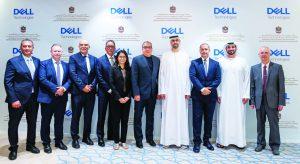DUBAI / WAM
Omar bin Sultan Al Olama, Minister of State for Artificial Intelligence, Digital Economy, and Remote Work Applications, emphasised the commitment of the UAE government, led by His Highness Sheikh Mohammed bin Rashid Al Maktoum, Vice President and Prime Minister of the UAE and Ruler of Dubai, to prioritise community health.
The government’s approach involves harnessing advanced digital technology and artificial intelligence to address the prevailing challenges in the healthcare sector. This strategic utilisation of cutting-edge innovations has yielded favourable outcomes, positively impacting the well-being of communities and ensuring the provision of optimal healthcare services.
This came during his speech in a session organised by the Artificial Intelligence, Digital Economy, and Remote Work Applications Office, in partnership with Dell Technologies, titled “Accelerating Innovation with Precision Medicineâ€.
The session brought together policymakers, healthcare researchers, developers, and technologists. Its primary objective was to facilitate discussions on strategies to optimise the integration of technological advancements in the realm of precision medicine.
Omar Al Olama stated that the advancement of renewable systems utilising cutting-edge digital technologies and artificial intelligence, along with the rapid progress in precision medicine, constitute pivotal elements in elevating the overall well-being of individuals within society. These endeavors are crucial in fostering superior healthcare capabilities, enabling the sector to effectively address challenges through the utilisation of technology, enhancing the realms of diagnosis and treatment, optimising healthcare delivery efficiency, and streamlining work methodologies.
Mohammed Amin, Senior Vice President, CEEMETA, Dell Technologies, said, “From stimulating smart cities to fueling new medical discoveries, AI is now an intrinsic part of our everyday lives. By drawing on the power of AI, nations can drive change to attain tangible and measurable benefits. He added, “the UAE is strongly positioned to embrace new opportunities to shape the digital economy of tomorrow. We are excited about the future and look forward to supporting the government’s efforts in building a digitally transformed thriving economy.â€
A distinguished panel of speakers contributed to the session, including experts such as Dr. Walter Kolch, the Director of Systems Biology Ireland (SBI) at University College Dublin (UCD), who holds ranked number 3 in the world for “Precision Medicine†and is in the world’s top 50 researches for Proteomics, System Biology and Signal Transduction (Google scholar). Additionally, the session featured Mohammed Amin as well as Dr. John O’Shea, Chief Digital Transformation Officer at Dell Technologies. Other participants included Mei May Soo, Director of Data Science and Artificial Intelligence at Dell Technologies, and Tom DeMaria, from Dell Technologies’ Global SVB Multicloud Platform Ecosystems.
The session covered discussions on Dell global societal artificial intelligence ecosystem, focusing on its vision to harness the potential of artificial intelligence in addressing critical social, environmental, and health challenges on a global scale. The objective was to develop and deploy artificial intelligence solutions that not only yield positive societal outcomes but also contribute significantly to the advancement of sustainable development goals.
The vision focusses on fundamental principles that entail leveraging artificial intelligence to realise collaborative benefits in partnership with government and private sectors, institutions, and societies. The key objective is to develop artificial intelligence solutions that foster positive societal transformations and enhance the well-being of communities. This vision also emphasises the importance of upholding ethical standards in artificial intelligence practices, promoting transparency, adopting ethical frameworks, and implementing best practices in the data privacy field and effectively address challenges associated with artificial intelligence.
The session showcased the successful experiences of AI digital twins’ cancer (colon cancer) and the experience of integrating artificial intelligence technologies to enhance efficiency, productivity and decision-making. The speakers indicated that treating cancer through digital twins and artificial intelligence is one of the promising applications that are based on a virtual representation of an object or Practical in the real world, it can be used for analysis, simulation and optimisation and in the case of cancer treatment, in which a digital twin can be created to model an individual patient’s tumor and its response to different treatments.
The session explored into the process of cancer treatment programme through the utilisation of digital twins and artificial intelligence. This approach involves assimilating data from diverse sources such as medical imaging, genetic data, patient records, and real-time monitoring data to construct a comprehensive tumor model. This model incorporates advanced algorithms and machine learning techniques to simulate tumor behavior and its dynamic progression over time. Additionally, the session showcased the initial pilot programme that leverages digital twins and artificial intelligence to address challenges associated with cancer, while also introducing the concept of mechanical modeling in cancer research.
During the event, Minister Al Olama and Mohammed Amin signed an MoU to explore, develop and accelerate the innovation in the digital field.
 The Gulf Time Newspaper One of the finest business newspapers in the UAE brought to you by our professional writers and editors.
The Gulf Time Newspaper One of the finest business newspapers in the UAE brought to you by our professional writers and editors.
